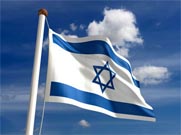Major parties contesting Israel's February 10 elections
 Tel Aviv - Below are the main parties contesting Israel's upcoming election on Tuesday:
Tel Aviv - Below are the main parties contesting Israel's upcoming election on Tuesday:
Kadima - Founded in late 2005 by then-premier Ariel Sharon after breaking away from the hawkish Likud, Kadima won the 2006 election, but polls show that under new leader, Foreign Minister Tzipi Livni, it may not emerge from Tuesday's election as the largest party.
Kadima is campaigning on a platform of continued peace talks with the Palestinians which will see Israeli and Palestinian states living side-by-side.
Its economic platform states that it will continue to promote a moderate, market-based economy but "will create the physical and human infrastructures necessary to rectify existing market failures."
Kadima has 29 members in the outgoing Knesset (out of 120).
Likud - Led by former prime minister Benjamin Netanyahu, the Likud is tipped in most polls to emerge from Tuesday's election as the largest party in parliament.
Netanyahu advocates building an "economic peace" with the Palestinians alongside a political peace, but rejects any withdrawal to the borders which existed before the
1967 war and says he will not divide Jerusalem, whose eastern sector Palestinians want as the capital of their future state.
The party is also in favour of a free market economy, albeit one which "is sensitive to social concerns."
Likud currently has 12 seats in parliament.
The Labour Party - The modern incarnation of parties which led Israel from its inception in 1948 to 1977, the Labour Party, led by another former prime minister, Ehud Barak, is predicted to receive its lowest-ever election result on Tuesday.
The party favours continued peace talks with the Palestinians to reach a two-state solution, and Barak has intimated he is not opposed to allowing Palestinians sovereignty over some Arab neighbourhoods in East Jerusalem .
Labour is opposed to some of the economic liberalism which has dominated Israel's recent economic policies and says it will act to reduce social gaps in income.
Labour goes into Tuesday's election with 19 Knesset seats.
Yisrael Beteinu (Israel Our Home) - is, according to the polls, the surprise of the election, predicted to become the fourth, or even third-largest, party in parliament.
Led by Avigdor Lieberman, a veteran immigrant from the former Soviet Union, the party's core support comes from new immigrants, mostly from the former Soviet Union, and hard-liners who think Israel's approach to peace making has been unrealistic.
The party advocates a "land for land and peace for peace" approach to the Israeli-Palestinian issue, supporting the exchange of Israeli areas with a large Arab population, in return for Israel being allowed to retain Jewish settlements in the West Bank.
Lieberman's campaign however has mainly focused on what he calls the "radicalization" of Arab-Israelis, and he demands that those who sympathise with Israel's enemies and show no "loyalty" to the state be striped of their citizenship.
The party has 11 seats in the Knesset.
Shas - A party representing ultra-Orthodox Jews of Sephardi (Middle Eastern or North African) descent, Shas has in recent years also been targeting Israelis in the lower-income bracket, who benefit from the party's subsidized education and social service network.
Shas' main focus is on religious life in Israel, and it campaigns vehemently for greater observance of Jewish laws.
Although Shas is opposed to any division of Jerusalem, Judaism's holiest city, it has a more pragmatic approach to other territorial concession, if these would save lives. It is, however, opposed to unilateral concessions.
Shas has 12 seats in parliament.
The New Party-Meretz - A union of left wing and dovish parties, it advocates an end to the Israeli occupation of the West Bank and the withdrawal of Israeli troops and settlers from the occupied territories, and the division of Jerusalem into the capitals of Israeli and Palestinian states.
It also advocates a welfare state economy and its also campaigns vociferously for minority rights.
The party currently has 5 seats in parliament, and is not expected to increase its representation significantly.
United Torah Judaism - An alliance of two ultra-Orthodox parties, it advocates a stricter application of Orthodox Jewish law, and also campaigns for the extension of housing and social benefits to the growing ultra-Orthodox population.
It is prepared to join governing coalitions, but generally declines to assume ministerial portfolios, for to do so would mean acceptance of the secular Israeli state.
United Torah Judaism currently has 6 seats in parliament.
The Jewish Home - A recent amalgamation of several ultra- nationalist and religious parties, it opposes the creation of a Palestinian state in the West Bank, and rejects the evacuation of Israeli settlements, and the division of Jerusalem.
It currently has 9 seats in parliament.
Hadash - A left-wing party with roots in the Israel Communist party, it is an Arab-Jewish party, but with a predominantly Arab electorate.
It advocates a Palestinian state alongside Israel and promotes the rights of Arab citizens.
Hadash has four seats in parliament.
The United Arab List - This party advocates a two-state solution to the Israeli-Palestinian conflict, supports the separation of religion and state, and desires affirmative action for the benefit of Arab-Israelis.
It won four seats in the 2006 election.
Balad (The National Democratic Assembly) - Another Arab party, it supports a complete Israeli withdrawal from the West Bank, demands cultural autonomy for Israel's Arab minority, and seeks complete separation of religion and state.
It goes into Tuesday's election with three seats.
The Pensioners' Party - The surprise of the 2006 election, when it won 7 seats, it seeks to protect the rights of pensioners, including pension rights, and enlarging national health insurance and services for the elderly.
Polls forecast that it may not pass the electoral threshold in Tuesday's election. (dpa)